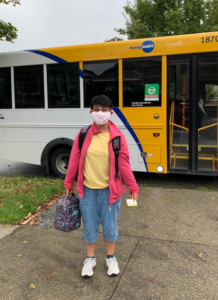By: Jeevan Basra
 I was born on November 21, 2001. I don’t remember that day, but over the years I have heard many stories about how I was born not breathing.
I was born on November 21, 2001. I don’t remember that day, but over the years I have heard many stories about how I was born not breathing.
I don’t remember being transferred to BC Children’s Hospital, but I know I stayed there for a long time.
I have seen lots of photos of me as a baby with an NG tube taped to my face and feeding tubes in my stomach.
Every day I see the scars on my chest and stomach from the lifesaving surgeries I’ve had throughout my life. Sometimes I see them as badges of honor. They tell my story of strength and resiliency. Other times, I am not so proud of these scars, as they are reminders of the challenges and struggles that I’ve had to face every day.
I was born with Kabuki Syndrome, something I did not choose, but I live with every single day. I have pulmonary stenosis. I am hearing impaired and I have a laryngeal cleft. I also struggle with arthritis and low muscle tone.
When I was young, the At Home Program helped me to pay for speech therapy, physiotherapy, and occupational therapy. These costly programs helped me learn to speak so others could understand me. They helped me manage my arthritis symptoms and I learned how to write so others can read my notes. They also helped me manage my pain.
When I turned 18 years old I started getting PWD benefits and I lost access to all of the support therapies I had received through the At Home Program.
Nothing changed regarding my needs when I turned 18 years old. I still had arthritis, my cleft did not repair itself and I did not suddenly wake up with strong muscles.
Living with Kabuki Syndrome has limited my ability to find employment, pursue higher-level education, and it leaves me dependant on my family to help me with my day-to-day living.
I appreciate the PWD benefits I receive every month, as I depend on these funds to get by on a daily basis. However, the funds I get do not cover my monthly expenses and the preventative therapies I need to manage my health.
There are things in my life that I would like to do, but I do not have a choice in the matter. I don’t have the ability to drive a car, graduate from high school with a Dogwood certificate, or get a university degree because of the diverse needs I was born with. These are things that are not in my control. They cannot be changed with money. If the government, however, were to support therapies like physiotherapy, occupational therapy, mental health support, and dentistry, this would improve my life and the lives of others like me.
